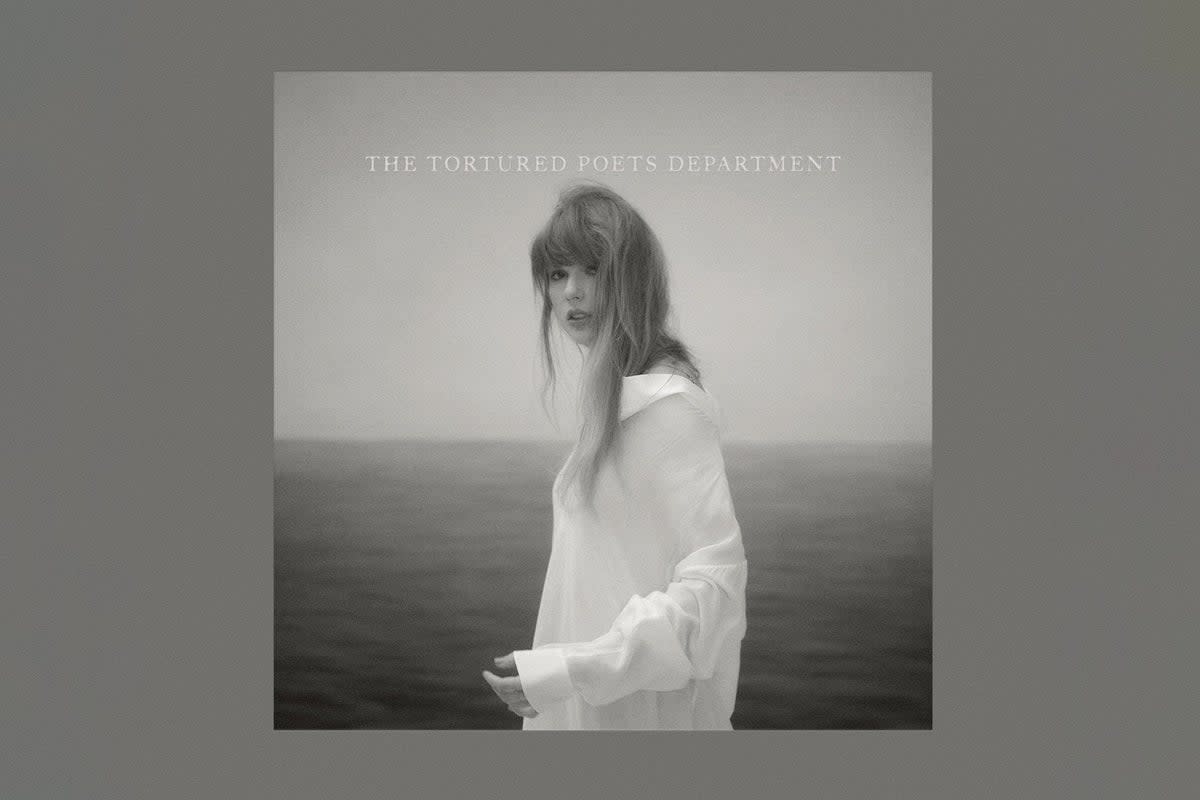Taylor Swift, The Tortured Poets Department review: Irresistible, country-hued tales of relationships past and present

Taylor Swift’s 11th studio album, The Tortured Poets Department, comes complete with a handwritten poem titled “In Summation”. In it, an unnamed artist defends a recent romance that she/he insists was “not a love affair” but a “mutual manic phase… self harm… house then cardiac arrest.” And yet there is no defeat here. Swift continues: “A smirk creeps onto the poet’s face/ Because it’s the worst men that I write best.”
The album – with a sound that takes the moody electronica of 2022’s Midnights up a gear – goes on to chart the course of a relationship with a lover who has brought “chaos” and “revelry” to the life of a good woman with a reputation to maintain. At times, the singer is swept off her feet by their dangerous chemistry, defending her self-destructive paramour against critics. “He only runs because he loves me,” she swaggers. Other times, she’s left “crying at the gym”, broken by the loss of her “cosmic love” and “twin”. Finally, he’s dismissed as a “conman” selling “get-love-quick schemes. Mr Steal Your Girl Then Make her Cry”.
Critics like me get shredded on Twitter/X when we link a pop star’s lyrics to events in their personal lives. To do so is apparently “unprofessional” – even though the artists themselves clearly use their work to give, twist or deflect from the reality of their emotional entanglements. Fans spend years decoding lyrics online, and songwriters as canny as Swift happily deal into the game by writing cryptic lyrics loaded like crosswords. On this album, Swift even sings that motivations may be “declassified” in 50 years’ time. Ha!
So at the risk of another social media mauling, I’m going to inform the general reader of the backstory here. In 2023 Swift announced the end of her six-year relationship with English actor Joe Alwyn, after which she embarked on a brief fling with the hard-living, controversy-courting Matty Healy (frontman of The 1975) with whom she’d been previously linked in 2014. The dalliance was short-lived and ill-judged – according to some fans, at least, who threatened to cancel Swift over Healey’s behaviour. She’s since been in a highly publicised relationship with NFL superstar Travis Kelce in what appears to be a fairytale love story.
The songs on Tortured Poets, then, could very well be interpreted as autobiographical snippets of this time. Opener “Fortnight” (feat Post Malone) appears to hint at the Healy love affair, while “So Long, London” (on which the singer is “pissed off you let me give you all that youth”) seems to recall the ending of things with Alwyn.
But really, it’s more likely Swift is fictionalising a range of good girl-bad boy dramas; the musician who scored an early hit swooning over a guy who “made a rebel of a careless man’s careful daughter” certainly knows the dynamic makes cracking song-fodder. And while her previous album, Midnights, seemed to bounce off glitchy phrases aimed at TikTok, this record draws powerfully on Swift’s country roots, spooling out longer narratives and tassel-flicking out the witty wordplay.

In keeping with the literary (if ungrammatical) album title, Swift is on her most piercingly polysyllabic form here. In a year when pop music has been slammed by academics for dumbing down the youth, Swift will be charting words like “rivulets” and “litany”, as she eye-rolls at her own “teenage petulance”. She’s not claiming any grand titles for herself. On the title track she dismisses all pretensions – “You’re not Dylan Thomas/ I’m not Patti Smith/ This ain’t the Chelsea Hotel… We’re modern idiots” – before undercutting that self-awareness with a genuine plea for love and connection. Her ability to put her lines over is as compelling as ever. I defy anyone not to lean into Swift’s concisely charged storytelling.
Her conversational tone is given dramatic ballast by the mighty Florence Welch on “Florida!!!”. Drums come pounding through the soft, synth beds and the English singer howls of being “barricaded in the bathroom with a bottle of wine/ Me and my ghosts had a hell of a time”. Welch can yowl threats where Swift’s thinner voice could ever only hiss – but that doesn’t mean Swift isn’t a woman in full command of her powers. The force she brings to “But Daddy I Love Him” is thrilling, as she lassos a few country tropes to charge her horses at online trolls. “I don’t cater to all these vipers dressed in empath’s clothing,” she warns, reminding fans that her “good name” is hers to “disgrace” with a “wild boy” if she so chooses. Their “sanctimonious soliloquies” are “white noise to me”, she sings. Swift is equally uncompromising on “Who’s Afraid of Little Old Me?” – a track on which she assures listeners she is more than capable of standing up for herself. On piano ballad “The Smallest Man Who Ever Lived”, she sneers at a lover who appeared to roar like a lion and left her with the blandest goodbye.
Tortured Poets is a record that explores failure and triumph with the same bittersweet nuance. Swift concedes that actually she can’t fix him on “I Can Fix Him (No Really I Can)” and high-fives herself for persisting with her jazzhandsy day job despite personal desolation on “I Can Do It With a Broken Heart”. As was the case on Midnights, these melodic hooks take time to sink in. But trust me, they’ve got anchors – designed to lodge slowly and securely in the mental seabed. The stories will snag you and you’ll be surprised to find yourself humming choruses hours later. Although vinyl versions will end with one of three extra songs, the standard album concludes with the perspective grounding “Clara Bow”, on which Swift puts her current mega fame in historical context, remembering the silent film star’s allure along with that of “Stevie Nicks in ’75” (another reference to Healy’s band?) before imagining a future celebrity being compared to herself : “You look like Taylor Swift/ You’ve got edge she never did…”
The whole album is a terrific reminder of the intense, personal connection Swift can conjure in song. She fills arenas and dominates the news agenda because listeners can relate to her starry dramas – her tales endow their own experiences with new electricity. She sets marriage hopes and unrealistic sexual fantasies within terrifically empowered stories. Whether fans are shaking off their own Joe Alwyns, shagging their own Matty Healys or cheering on their own Travis Kelces, the archetypes are neatly nailed. The worst men really do leave some women with the best lines.


